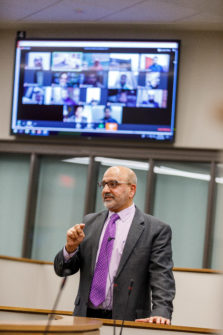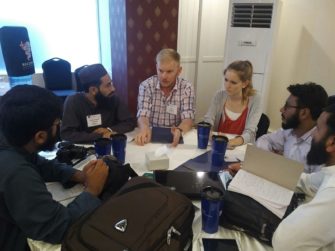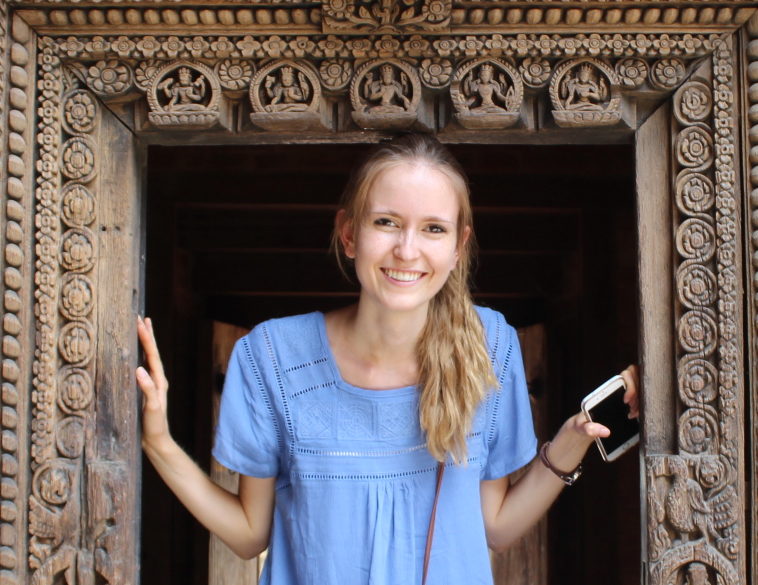
“What do you think is the biggest difference between Pakistan and the United States?” I asked my weekly discussion group of young Islamic studies scholars in the Madrasa Discourses project. I was expecting answers related to Pakistan’s religious society compared to the secularity of the United States, differing gender roles, or notorious Western values, but one female student, Haya, took me entirely by surprise by saying, “In Pakistan, we are much more free.” As a young woman in the United States, I could not imagine that I was living in a more restrictive society than my peers in Pakistan. I am in my third year of studies at the University of Notre Dame, majoring in Neuroscience and Peace Studies. My experiences studying in a male-dominated science field and traveling the world independently have shown me the expanse of my freedom in comparison to women in previous generations and individuals living under more repressive governments. Generally, citizens of the United States pride ourselves on our freedoms, boasting of the liberties guaranteed by the First Amendment of the Constitution, but are these the most crucial aspects of freedom? I probed her further, asking how she saw Pakistan as a freer society. She replied by saying that the United States has so many laws and fines, citing speed limits as a specific example, but in Pakistan citizens can largely live according to their own rules. This statement made me wonder: is greater individual agency indicative of freedom or anarchy? Perhaps more importantly, do socially-enforced norms impact the freedom of citizens more than the few legal codes that are in place?

This exchange occurred in the context of a dialogue group for the Madrasa Discourses Peace Lab that I am participating in at the University of Notre Dame. The Madrasa Discourses Project is a three year course that encourages madrasa-educated students to recover methodologies and perspectives from their own tradition to face modern challenges, invites them to question why they hold certain beliefs, and fosters conversation with members of other cultures in an open-minded way. The madrasa graduates, all from India and Pakistan, participate in several weekly classes and discussion groups, as well as onsite intensive programs during the summer and winter. By bringing traditional Islamic learning into conversation with new knowledge, ideas grounded in the students’ madrasa education are challenged. They are forced to see their own definitions and belief systems from an outsider’s perspective in order to better defend those beliefs or adapt them to modern circumstances. Madrasa Discourses encourages the graduates to arrive at their own carefully reasoned definitions, rather than blindly accept those handed to them. This project also requires intercultural conversation in discussion groups comprised of participants from India, Pakistan, and the United States. The cohort from the United States consists of undergraduate students at Notre Dame, such as myself. We also benefit from engaging with questions related to freedom, culture, and identity during these intercultural conversations and from forming meaningful relationships with students living across the world. In these discourses, all participants come to a better understanding of each other’s worldviews and the peace that can be brought about through sustained dialogue and reflection.
My conversation with Haya opened my eyes to the ways that cultural and experiential differences can lead to varying conceptualizations of the same word. At first, I thought Haya simply did not understand the true meaning of freedom. In my eyes, laws are in place to protect our larger freedoms, such as religious practice, private property, and self-expression, not to take away our agency. In the days following this discussion, the question followed me: Am I really living in a free society? The Oxford Dictionary Online defines freedom as “the power or right to act, speak, or think as one wants.” According to this definition, Haya may have a better understanding of the word “freedom” than I do. This realization opened me up to a larger inquiry: Who has the authority to set a definition for a word, and how can intercultural dialogue be successful if our definitions of key concepts are different? I reflected specifically on the importance of subsidiarity in reaching a definition, the necessity of sustained dialogue between cultures, and the ways in which the Madrasa Discourses project at the University of Notre Dame attempts to tackle these issues.
Subsidiarity is the principle that people, associations, and institutions closest to a matter are best able to respond because they have a “fine-grained sense of the texture” of that matter (Whitmore, 174). This concept applies in the context of creating definitions because the people who live in a particular society are best able to state what a particular idea means to them. Outsiders cannot impose their own beliefs or demand that these societies conform to a rigid, pre-established definition because that word would no longer sustain its meaning. Americans cannot assume that our perception of freedom is universal. The meaning of freedom in the United States is grounded in the legal framework of the Constitution, but that document is not relevant in other cultures. As tempting as it may be for me to conclude that Haya misjudged the true sentiment of freedom, I must examine the influences behind my own definition first. Members of Western societies often assume that their ideals and conceptions are correct, and others’ conflicting views are problems that can be solved through cultural imperialism, but that is not the case (Lederach and Appleby, 28). The instances of freedom or abuse that one recognizes are dependent on one’s social location (Price, 2012). What one individual interprets as confining may be perceived as liberating from another’s point of view.

Identifying and clarifying these examples of inconsistency is essential for intercultural conversations. In another group discussion, the topic of gender roles came up and a debate ensued about the particular freedoms of women in Muslim societies. We were looking specifically at the fact that a woman must obtain consent from a male guardian to travel or attend university in Saudi Arabia. The Indian and Pakistani men argued that these guardianship laws are in place only to protect the women from dangerous situations. I braced myself to defend my ideas about women’s rights, expecting little support from the Pakistani women. I presumed that their decisions not to show their faces on the video conference was an indication of submission to patriarchal societal norms. Again, my preconceptions were tested when the other female student, Momina, said, “I am speaking as a feminist… How will a woman know how to judge for herself about the world if you are going to pamper her every time?” Upon reflection, I recognized my flawed perception of the Pakistani women’s freedom. I assumed they were unaware of cultural violence in their societies because of their decision not to show their faces. Momina is not blind to the use of religious beliefs to justify the institutionalized restriction of women to their homes and local communities. She fights against the practices that she feels restrain her freedom, while still actively choosing to preserve her modesty. I came to realize that veiling oneself can be an act of freedom to live according to one’s religious beliefs and assert agency over how the world perceives you as a woman and human being. This conversation forced me to challenge my fixed understanding of feminism to appreciate that what I first saw as a patriarchal restriction may be an act of religious freedom and self-expression for some women. After this conversation, I realized that Momina is much more qualified to assess her own freedom than I am as a member of a starkly different culture. In this way, definitions should be set by the members of the culture that will use the term so that words can be applied most accurately. The need for culturally relevant definitions, however, does not imply a complete concession to relativism. Moral and practical objectivity also plays an important role in intercultural conversations.
The question surfaces again: if all cultures have accurate, but different definitions for concepts, how can intercultural conversations be successful? The key to these intercultural discussions is a sustained commitment to dialogue to humanize and better understand those with opposing views (Freire, 68). Initially, a great deal will be lost in translation between two groups or individuals with different cultural backgrounds, but continuous discourse provides an avenue to bridge that divide. Each participant in the conversation must recognize the cultural basis of their set definitions, appreciating that no one definition is universally accurate, and be open to the different perspectives of those whom they encounter. All members share what the idea, such as freedom, means to them so that a collective definition can be built up. Diversity in these discussion groups should be maximized because the “broader the coalition’s base, the clearer it becomes that no single religious outlook can be taken for granted as a framework for discussion” (Stout, 227). It is even possible that the intercultural discussion group can, in a sense, form a new culture grounded in the mutual notions that they construct together. The most fruitful conversations in our discussion group emerged when we shared our individual understandings of the topic at hand, creating collective definitions before delving into discussions of differences in worldview. Precise language is critical to dialogue, so this process of building up shared definitions is incredibly important. After coming to a more robust understanding of Haya’s perception of freedom, I succeeded in learning more about my own views on agency, challenging cultural preconceptions about Islamic feminism, and building stronger relationships with my international peers.

